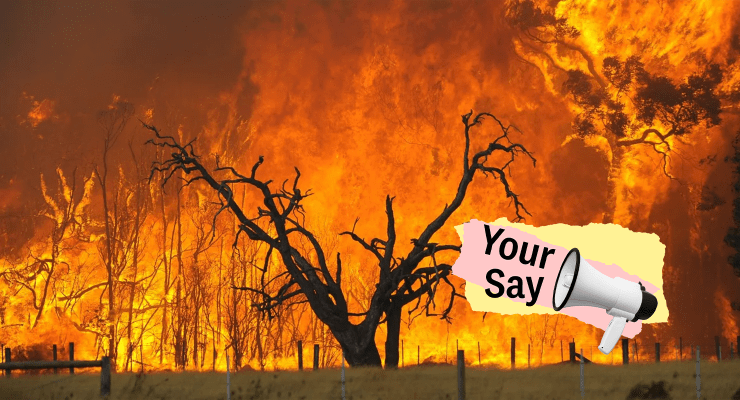
Andrew Waterhouse writes: I hate to be cynical about a number of the arguments in “How gender and racial exclusion are driving Australia’s megafires”, but as a long-time firefighter (50+ years) and someone who desperately wishes we had better tools, the omission of certain glaring facts from the cultural burning debate does not help us get to the answers we so badly need, if such answers exist at all.
These facts include that from when colonisers arrived and to the present day, we have:
- Cleared and continued to clear huge tracts of vegetation landscape;
- Displaced First Nations peoples who tended that landscape;
- Introduced non-fire-resistant vegetation;
- Built multitudinous houses, sheds, fences and towns, and introduced vast numbers of fire-vulnerable livestock in a way that massively militates against, say, gentle continuous burning across the broad acres;
- Operated machinery that often causes fire by accident;
- Contributed not insignificantly to the trajectory of human-induced global warming, which in turn renders the “new” landscape much more prone to fire and natural (lightning) ignition.
Leaving aside greenhouse culpability, turning the clock back and starting again is an attractive solution until, point by point, you consider the implications.
I don’t dispute that the fire services remain disproportionately male, although thankfully that’s changing slowly, but the problems as adduced above go well beyond gender, and I would need a more compelling argument than “too many blokes” or the implied solution of “blokes just getting out of the way”.
There are, of course, many areas of potential improvement in fire mitigation practice, but if you have been on the fireground enough, whatever your gender or ethnicity, you know how difficult fine-tuning prescribed burns over large complex landscapes can be, especially in times of drought and narrow windows of opportunity.
Perhaps out of ignorance, it’s a case of damned if you do and damned if you don’t, but until someone can come up with genuinely viable burn plans that address, for example, how to mitigate fuels in the vast wild terrains of big national parks, that is the choice we are faced with. On balance, I think we have to burn, albeit always earnestly trying to do better and with less damage.
Jean John writes: Yes, we absolutely should tap into the wisdom of 65,000 years of containing bushfires owned by Indigenous women and men, if for no other reason than why keep doing something over and over again that you know doesn’t work i.e. white man’s methods? We have caused more damage to the land in 235 years than was caused in the 65,000 years of Indigenous stewardship.
Sorry not sorry
Neil Churches writes: Who really gives a tinker’s cuss over the Monarchist League and Eric Abetz’s injured feelings? I certainly don’t (“‘Sorry they were disappointed’: ABC’s Ita Buttrose offers fig leaf to monarchists”). The ABC has no case to answer.
Garrett Gundry writes: The only thing Ita Buttrose and the ABC need apologise for — opined with my tongue firmly in my cheek — is that the coverage went on for so long (in my region) on ABC 20, 21 and 24. There was no escape!
David Wright writes: Because I don’t want to see an elected president or one appointed by Parliament, I suppose I’m a monarchist of sorts. One only has to look to America and see the failures of its system to want to wish it on ourselves. So I support the monarchy only because of the protection from the Donald Trumps of politics.
I did not watch much of the coverage of coronation on the ABC and none on any other source. I suppose King Charles will entertain the tourists, open public buildings and perform the other meaningless tasks that a constitutional monarch does. What he does or does not do affects Australia and Australians not one jot. However, enormous damage was done to our land and its people in the name of the Crown. The bits and pieces I saw of the tedious ceremony and the preamble to it quite rightly pointed out some of these wrongs: wrongs that continue to this day.
Ita Buttrose has nothing to apologise for, and nor do any of the commentators. They were not making up lies or exaggerating the situation. If the monarchists did not like it, too bad. They should get their heads out of their arses and see the monarchy for what it is, and see what white settlers have done to this fragile land and what they’re still doing to it.
Jean Lightbody writes: I don’t think Buttrose did apologise. She just made a statement about being sorry that there are so many people who don’t want to hear the truth of how colonisation has affected Indigenous peoples.
Funny that Eric Abetz takes such exception to a “Clayton’s apology” when conservatives have developed it into an art form.
Ed Cory writes: Buttrose should not have “apologised”, because there was nothing to apologise for. The truth hurts some people sometimes. Just stiffen the ABC backbone and have some more truth-telling. If we want bias, blindness and dog-whistling, we know we can get it elsewhere. We don’t want or need that from the national broadcaster.
Bob Morgan writes: The ABC should not have apologised for the coverage and discussion about Indigenous dispossession, incarceration and racism. Furthermore, if the monarchists are so incensed, they should strongly consider moving to the UK so they can see the royal family whenever they desire.
WFH truths
Jess Martin writes: I am fortunate enough to be able to work from home full-time with no obligation to go into the office unless I want to (“Working from home: employers love flexibility… except when it benefits workers”). My husband works from home two days a week. This has meant two things to me and my family.
First, I am healthier and happier. I have the time to exercise (most days) because I am not commuting, giving me more mental and emotional capacity for the rest of my life, and I turn up as a better version of myself for my young son, my husband, the people around me and my job.
Second, my husband is more engaged in the unpaid labour that goes on at home. He can do a load of washing between meetings, cook dinner, do daycare drop-off and pick-up, all things that would otherwise fall on me.
Why is it that the people who are telling us to go back into the office are typically middle-aged white men? Oh, that’s right. It’s because their privilege has meant it’s always been about them.
David Penington writes: I’m a software developer. Working from home has been a big success for me, rescuing me from the horrors of overcrowded hot-desking in noisy open-plan offices. Because my employer chose not to provide adequate space for extra staff, it had become terrible if you were not an early starter or if you needed to concentrate to solve difficult things. And physical presence doesn’t always break through silo walls.
I worked from home for half the two years before COVID. I would go in for meetings if given warning. Hybrid meetings disadvantage people who are online. Fully online meetings are vastly better. The company was split across a couple of buildings, so terrible hybrid meetings happened even if I was in “the office”. Since COVID I’ve spent one unpleasant day in the office. If you want me in the office, give me an office, not an open-plan, hot-desking mess.
Balancing acts
Dr Tony Sara: The figures provided in “Just 5% own nearly half of Australia’s $3.5 trillion in superannuation assets. Why?” do not reflect that the old schemes, the defined benefits schemes offered by state (and possibly federal) public services, were closed to new contributors in the late ’80s. They were very generous, with an enormous employer contribution, such that mine had $2.4 million on a salary of $330,000 at retirement a few years ago.
Schemes since then were accrual-only, with the super guarantee contribution only, and could never get to such dizzy heights. So the figures are ambiguous at best and misleading at worst because they do not reflect this.
Sean Crummey writes: I’m in the 60-64 age bracket and got interested and serious about superannuation in my early 40s. I listened to much of the financial advice available and worked at building up my super balance. I didn’t have to pay for the financial advice — it was good general free advice such as on money shows on the radio, etc. I’ve observed others in a similar age bracket. Some decided they’d prefer to invest in property. Others ignored the issue of ageing, retirement and making any sort of plan. They’re suddenly facing a reality check.
In my workplace, nearly everyone ignores their superannuation. I tend to think that financial education around things such as superannuation might help many people.








Crikey is committed to hosting lively discussions. Help us keep the conversation useful, interesting and welcoming. We aim to publish comments quickly in the interest of promoting robust conversation, but we’re a small team and we deploy filters to protect against legal risk. Occasionally your comment may be held up while we review, but we’re working as fast as we can to keep the conversation rolling.
The Crikey comment section is members-only content. Please subscribe to leave a comment.
The Crikey comment section is members-only content. Please login to leave a comment.